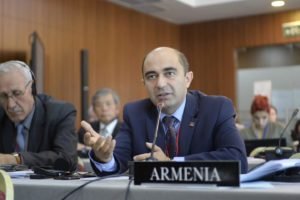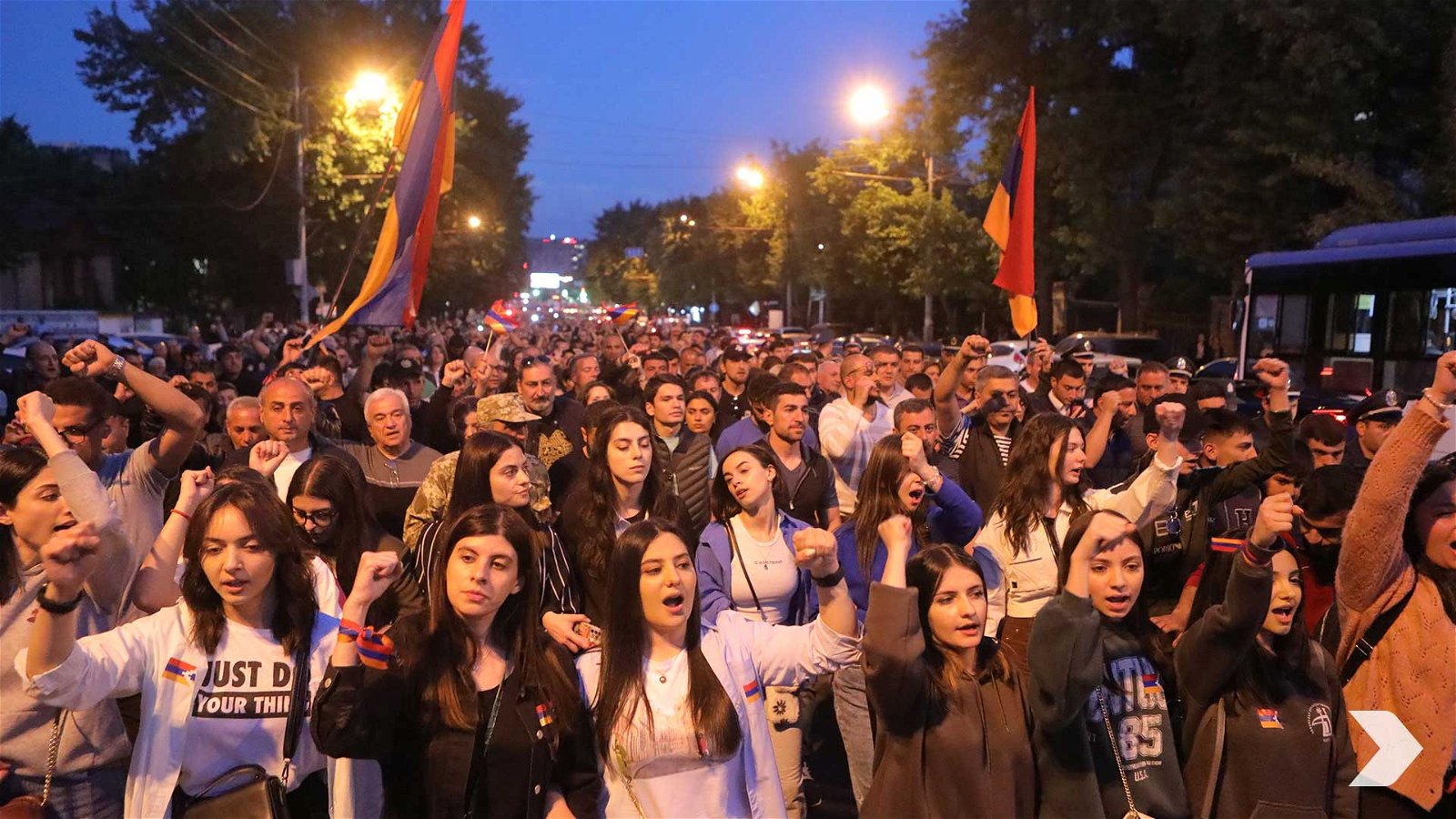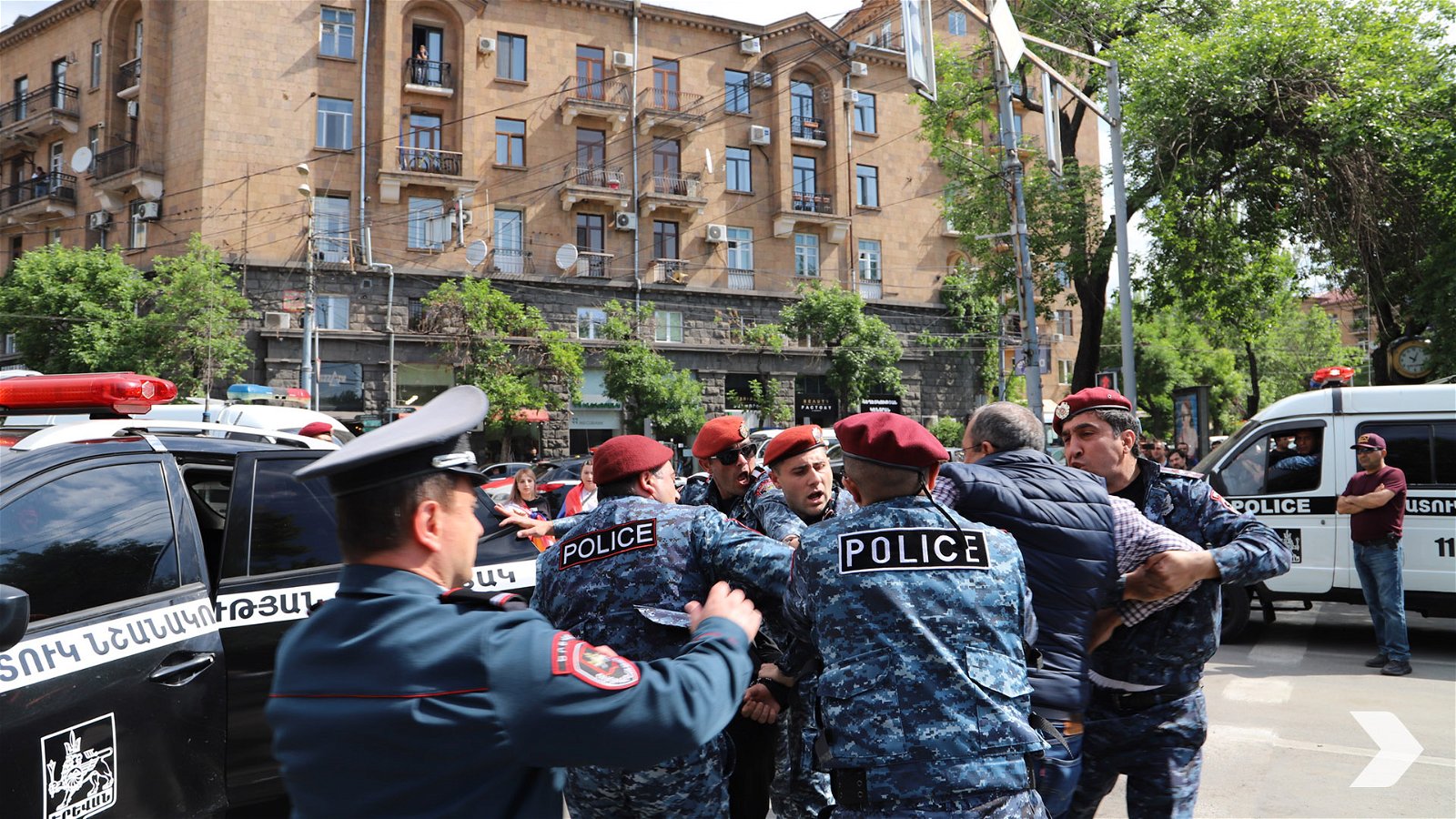
Armenia’s ambassador-at-large Edmon Marukyan has revealed the contents of a six-point proposal to Azerbaijan regarding the issues Armenia wants on the agenda for negotiations on a peace deal.
The proposal primarily states that Armenia has no territorial claims to Azerbaijan. Marukyan recalled that Armenia recognized Azerbaijan’s territorial integrity in 1992 when it signed the treaty establishing the Russian-led Commonwealth of Independent States.
“From the very beginning, every government of Armenia has announced that we have no territorial claims,” Marukyan said during the May 14 interview.
Furthermore, the proposal said that guaranteeing the security and respecting the rights and freedoms of the Armenians of Artsakh and determining the final status of Artsakh are fundamental for Armenia.
The proposal also reiterates Armenia’s commitments enshrined in the November 9, 2020, January 11, 2021 and November 26, 2021 trilateral agreements between Armenia, Azerbaijan and Russia.
“And what are those commitments? The return of prisoners of war, which has not been done until today, and the opening of communication links, which Azerbaijan also delays,” Marukyan said.
Moreover, the proposal states that Armenia is ready to start negotiations for the normalization of relations between Armenia and Azerbaijan based on international agreements including the United Nations Charter, the International Covenant on Civil and Political Rights and the Helsinki Accords.
Finally, the proposal states that Armenia has appealed to the OSCE Minsk Group co-chairs to mediate negotiations on a peace deal.
The six-point proposal responds to a five-point proposal submitted by Baku to Yerevan in March regarding the principles it wants enshrined in a peace deal. The five points include mutual recognition of each other’s sovereignty and territorial integrity, mutual affirmation of the absence of territorial claims to each other and a legally binding obligation not to make such claims in the future, refraining from threatening each other’s security, delimitation and demarcation of the border and unblocking of communication and transport links.
According to Marukyan, Armenian PM Nikol Pashinyan shared a six-point proposal with Azerbaijan’s President Ilham Aliyev during a trilateral summit in Brussels chaired by European Council President Charles Michel on April 6. Secretary of Armenia’s Security Council Armen Grigoryan did not publicize that Armenia had submitted such a proposal to Azerbaijan until May 5.
“Azerbaijan’s proposed points were not unacceptable for Armenia. With its six points, Armenia proposed that there should also be a resolution to the Nagorno Karabakh conflict in order for comprehensive peace to be possible. Now, our approach is that these two packages, 5+6 points, must be joined together to start negotiations over a peace treaty in order to find a long-term solution to the Nagorno Karabakh conflict,” Grigoryan said.
Azerbaijan’s Foreign Minister Jeyhun Bayramov said that the six points presented by Armenia are “not a proposal.”
He also suggested that Azerbaijan is not interested in mediation by the Minsk Group.
“This is happening at a time when there is no contact between the co-chairs of the Minsk Group against the background of the events in Ukraine. This group is almost paralyzed,” Bayramov said during a May 10 interview.
Armenian opposition figures have also criticized the six-point proposal for excluding an explicit stance on what kind of status Armenia considers acceptable for Artsakh.
Levon Zurabyan, a top aide to former president Levon Ter-Petrosyan, said that the proposal reveals that the Armenian government “does not understand anything about diplomacy and is literally insane.”
He specifically criticized the agreement for not presenting a concrete stance on core issues, such as the status of Artsakh and the mutual recognition of territorial integrity.
“Armenia has no idea what it wants to include in the peace treaty or what it wants to change in Azerbaijan’s proposals,” Zurabyan wrote on Facebook.

Meanwhile, opposition protests demanding the resignation of PM Pashinyan continued for a third week. Armenia’s two opposition parliamentary factions, the Armenia Alliance and the I Have Honor Alliance, organized the demonstrations in response to what they see as the government’s readiness to cede Artsakh to Azerbaijan.
The demonstrations have been marked by violent clashes between police and protesters and mass arrests. On Monday, police arrested 91 protesters who had staged a motorcade rally to slow down traffic in central Yerevan. On Tuesday, police arrested 414 people, the highest daily record of arrests since the start of the protests. The protesters had blocked more than 50 streets throughout the capital city. Police arrested 277 more people on Wednesday.
Law enforcement authorities have opened criminal proceedings against more than a dozen protest participants on charges of hooliganism and violence against the police. On May 17, the police opened a criminal case against two protesters accused of hitting a police officer on the chest during a rally in Yerevan and rendering him unconscious, according to the police report.

No such proceedings have been launched against police officers, despite criticism from human rights and civil society groups of the violent tactics used to disperse protests and conduct arrests.
Freedom House commented on the protests in Armenia for the first time on May 13. The US-based human rights organization said that it was “disturbed by violence taking place during protests targeting journalists, public figures, and ordinary citizens in Armenia,” appealing to the “people to exercise their fundamental rights peacefully” and the “police to refrain from using disproportionate force.”
“The Armenian authorities and the opposition must respect the unobstructed functioning of democratic and human rights institutions, including civil society and the media, necessary to guarantee the rights of all citizens in line with democratic norms and standards,” Freedom House tweeted.
Armenia’s Human Rights Defender Kristine Grigoryan has recorded the use of disproportionate force by the police during arrests and several instances of bodily injuries among protesters. Grigoryan’s office also criticized “insults and humiliation” directed at police by protesters and instances of swearing at and provoking civilians who were not participating in the rally.



Traitor Nikol has made it clear that he is willing to cede Artsakh to Baku. Any indications to the contrary are temporary obfuscations for domestic political purposes.
This is a very good deal for Armenia. Armenia needs to move forward . As the Only Christian Nation in the region, we have enormous economic upside once the specter of War is removed. Far too much Armenian blood and treasure has been put toward something that never had a sound foundation too begin with.
The Armenians of Artsakh are being sacrificied, for a shameful “peace”, whose real beneficiary is Azerbaijan, not Armenia, let alone the poor people of Artsakh. That means the ethnic cleansing of all remaining Armenians from Artsakh, the destruction of all Armenian heritage and the erasure of the millennia old Armenian presence, once Azerbaijan gets its hands on the rest of Artsakh. The wholescale destruction and erasure of everything Armenian is happening in the ethnically cleansed territory of Artsakh taken by Azerbaijan, just like it happened in Nakhichevan and in the rest of Azerbaijan. And this does not elicit any reaction from the so-called “international community”.
Did anyone figure out yet what that “international community” was?
Pressure from the international community is only of value if you acquiesce. What will do? Economically isolate us…. Been there. Attack us… been there diplomatically isolate us… been there.
Reduce the power of Armenia’s leaders… ahhhh getting warmer.